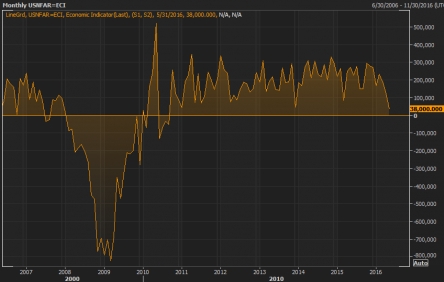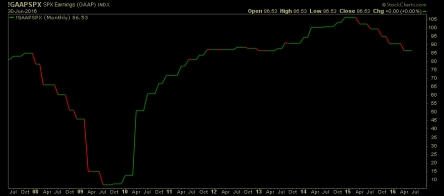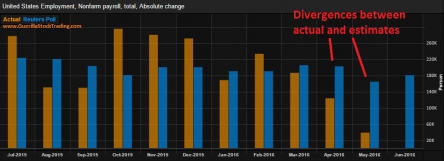A stock market crash in July could be coming straight at us. The Federal Reserve illusion of an improving US economy came to an end with June's employment situation report. Economists thought the US economy created 160,000 jobs in May. The actual number was a shocking 38,000.
As the chart of nonfarm payrolls shows, 38,000 was the lowest number of jobs created in a month since 2010.
The illusion that the economy was getting stronger ended. The Fed had to come clean and admit that no new rate hikes were coming. The nonfarm payrolls report proves that the economy is not strong enough for a rate hike.
The Economy Is Too Weak To Raise Rates
Rising interest rates are a measure of economic health. Rate hikes reveal the Fed's level of confidence that consumers and businesses can pay higher rates. We don't need to read the FOMC minutes to know what the Fed thinks about the future direction of the economy. All we have to do is track whether they raise, hold steady, or lower interest rates.
The Fed has little confidence in the US economy. Think about it. The Fed can't even raise rates more than a quarter point some eight years after the last recession. That's an incredible vote of no confidence by the Federal Reserve.
The Fed Funds Futures tells us when, and what the probability is for the next Fed rate hike. As of June 30th, 2016, here are the Fed Funds Futures rates for each FOMC meeting through February 2017.
July 27, 2016 = 0% probability of a rate hike.
September 21, 2016 = 6% probability of a rate hike.
November 2, 2016 = 6% probability of a rate hike.
December 14, 2016 = 14.4% probability of a rate hike.
February 1, 2017 = 14.4% probability of a rate hike.
The Fed Is Damned If They Do and Damned If They Don't
Bull markets do not die of old age; the Fed murders them. Traders think that as long as the Fed doesn't hike rates, the stock market will keep going up, but there's a big problem with that logic. Low rates hurt the heart of the US economy, banks.
Banks depend on interest income more than ever now that government regulation has stripped trading desks' ability to generate revenues and profits.
The largest banks in the US have had declining revenue for years, and the longer the Fed keeps rates low, the more pain is put on banks. Banks don't make as much money from the interest borrowers pay, but it gets worse when you consider falling earnings.
Earnings from S&P 500 companies are falling. Earnings have been falling for a year now.
Usually, when the Fed lowers rates, the economy gets going within a year (the average bear market lasts about nine months) and banks offset the cost of lower rates with increased bank loans from businesses. Instead of this cycle, we have low-interest rates and falling earnings, which mean companies are making less money and so they are less likely to borrow money, which cuts off another source of revenue for banks.
Earnings are Falling Yet the Market Keeps Going Up
U.S. companies are relying too heavily on financial engineering. Companies have spent record amounts of money on stock buybacks and acquisitions to push up stock prices. As the dot-com crash taught us, in the end, reality trumps illusion.
The Next Nonfarm Payrolls Report
The next nonfarm payrolls report is coming Friday, July 8, 2016. The consensus estimate for nonfarm payrolls is 180,000 jobs created in June. If we get another bad number of around 38,000 or less, the stock market could crash.
Right before a bear market, the consensus estimate and the actual number of jobs usually diverge. For example, in January of 2008, the consensus estimate was for 63,000 jobs created in December of 2007. The real number was 19,000. A month later, in February of 2008, the consensus estimate was for 25,000 jobs created in January of 2008. The actual number was -86,000 as the bear market began.
Today, we have a similar divergence according to Reuters polling.
A Stock Market Crash Is Coming
The bottom line: A stock market crash is coming. It could happen at any time. According to history, the months with the highest probability of a stock market crash are August, September, and October. The flashpoint in July will be the nonfarm payrolls report on July 8, 2016.



